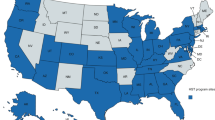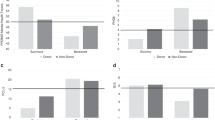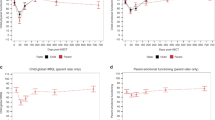Abstract
Hematopoietic cell transplantation (HCT) is a procedure that can significantly influence the socioeconomic wellbeing of patients, caregivers and their families. Among 30 allogeneic HCT recipients and their caregivers enrolled on a pilot study evaluating the feasibility of studying financial impact of HCT, 16 agreed to participate in the long-term phase, completed a baseline questionnaire and received phone interviews at 6, 12, 18 and 24 months post HCT. Analyses showed that by 2 years post HCT, 54% of patients who previously contributed to household earnings had not returned to work and 80% of patients/caregivers reported transplant as having moderate to great impact on household income. However, patients’ levels of confidence in their abilities to meet household financial obligations increased from baseline to 2 years. A relatively large proportion of patients reported inability to pay for medical care through this time period. Case studies demonstrated that patients' individual perceptions of the financial impact of HCT varies considerably, regardless of actual income. We demonstrate the feasibility of conducting a study to evaluate the financial impact of allogeneic HCT through 2 years post transplantation. Some patients/caregivers continue to experience a significant long-term financial burden after this procedure. Our study lays the foundation for a larger evaluation of patient/caregiver financial burden associated with HCT.
This is a preview of subscription content, access via your institution
Access options
Subscribe to this journal
Receive 12 print issues and online access
$259.00 per year
only $21.58 per issue
Buy this article
- Purchase on Springer Link
- Instant access to full article PDF
Prices may be subject to local taxes which are calculated during checkout



Similar content being viewed by others
References
Preussler JM, Denzen EM, Majhail NS . Costs and cost-effectiveness of hematopoietic cell transplantation. Biol Blood Marrow Transplant 2012; 18: 1620–1628.
Kim W, McNulty J, Chang YH, Weise M, Hashmi S, Ailawadhi S et al. Financial burden after allogeneic hematopoietic cell transplantation: a qualitative analysis from the patient's perspective. Bone Marrow Transplant 2015; 50: 1259–1261.
McNulty J, Khera N . Financial hardship-an unwanted consequence of cancer treatment. Curr Hematol Malig Rep 2015; 10: 205–212.
Khera N, Zeliadt SB, Lee SJ . Economics of hematopoietic cell transplantation. Blood 2012; 120: 1545–1551.
Majhail NS, Rizzo JD, Hahn T, Lee SJ, McCarthy PL, Ammi M et al. Pilot study of patient and caregiver out-of-pocket costs of allogeneic hematopoietic cell transplantation. Bone Marrow Transplant 2013; 48: 865–871.
Frey P, Stinson T, Siston A, Knight SJ, Ferdman E, Traynor et al. Lack of caregivers limits use of outpatient hematopoietic stem cell transplant program. Bone Marrow Transplant 2002; 30: 741–748.
Meehan KR, Fitzmaurice T, Root L, Kimtis E, Patchett L, Hill J . The financial requirements and time commitments of caregivers for autologous stem cell transplant recipients. J Support Oncol 2006; 4: 187–190.
Rizzo JD, Vogelsang GB, Krumm S, Frink B, Mock V, Bass EB . Outpatient-based bone marrow transplantation for hematologic malignancies: cost saving or cost shifting? J Clin Oncol 1999; 17: 2811–2818.
Khera N, Chang YH, Hashmi S, Slack J, Beebe T, Roy V et al. Financial burden in recipients of allogeneic hematopoietic cell transplantation. Biol Blood Marrow Transplant 2014; 20: 1375–1381.
Head BA, Faul AC . Development and validation of a scale to measure socioeconomic well-being in persons with cancer. J Support Oncol 2008; 6: 183–192.
Burnard P . A method of analysing interview transcripts in qualitative research. Nurse Educ Today 1991; 11: 461–466.
Krueger RA, Casey MA . Focus Groups: A Practical Guide for Applied Research3rd ednSage Publications: Thousand Oaks, CA, USA, 2009.
Pope C, Ziebland S, Mays N . Qualitative research in health care. Analysing qualitative data. BMJ 2000; 320: 114–116.
Majhail NS, Omondi NA, Denzen E, Murphy EA, Rizzo JD . Access to hematopoietic cell transplantation in the United States. Biol Blood Marrow Transplant 2010; 16: 1070–1075.
Stergiou-Kita M, Grigorovich A, Tseung V, Milosevic E, Hebert D, Phan S et al. Qualitative meta-synthesis of survivors' work experiences and the development of strategies to facilitate return to work. J Cancer Surviv 2014; 8: 657–670.
Kirchhoff AC, Leisenring W, Syrjala KL . Prospective predictors of return to work in the 5 years after hematopoietic cell transplantation. J Cancer Surviv 2010; 4: 33–44.
Syrjala KL, Langer SL, Abrams JR, Storer B, Sanders JE, Flowers ME et al. Recovery and long-term function after hematopoietic cell transplantation for leukemia or lymphoma. JAMA 2004; 291: 2335–2343.
Syrjala KL, Langer SL, Abrams JR, Storer BE, Martin PJ . Late effects of hematopoietic cell transplantation among 10-year adult survivors compared with case-matched controls. J Clin Oncol 2005; 23: 6596–6606.
Mosher CE, Redd WH, Rini CM, Burkhalter JE, DuHamel KN . Physical, psychological, and social sequelae following hematopoietic stem cell transplantation: a review of the literature. Psycho-oncology 2009; 18: 113–127.
Acknowledgements
We would like to thank Tammy Payton and Lih-Men Mau, PhD, MPH, National Marrow Donor Program (NMDP)/Be The Match, Patient and Health Professional Services department for assisting with the analysis of qualitative data. We thank the study coordinators at the Medical College of Wisconsin (Leigh Ann Laczkowski), Roswell Park Cancer Institute (Dana Cipolla, Lise Hernandez) and the University of Minnesota (Jenna Johnson) for their help in enrolling patients on the study. The NMDP provided funding for study participant honoraria. The CIBMTR is supported by Public Health Service Grant/Cooperative Agreement U24‐CA76518 from the National Cancer Institute (NCI), the National Heart, Lung and Blood Institute (NHLBI) and the National Institute of Allergy and Infectious Diseases (NIAID); a Grant/Cooperative Agreement 5U01HL069294 from NHLBI and NCI; a contract HHSH234200637015C with Health Resources and Services Administration (HRSA/DHHS); two Grants N00014‐06‐1‐0704 and N00014‐08‐1‐0058 from the Office of Naval Research; and grants from Allos, Inc.; Amgen, Inc.; Angioblast; Anonymous donation to the Medical College of Wisconsin; Ariad; Be the Match Foundation; Blue Cross and Blue Shield Association; Buchanan Family Foundation; CaridianBCT; Celgene Corporation; CellGenix, GmbH; Children’s Leukemia Research Association; Fresenius‐Biotech North America, Inc.; Gamida Cell Teva Joint Venture Ltd.; Genentech, Inc.; Genzyme Corporation; GlaxoSmithKline; HistoGenetics, Inc.; Kiadis Pharma; The Leukemia & Lymphoma Society; The Medical College of Wisconsin; Merck & Co, Inc.; Millennium: The Takeda Oncology Co.; Milliman USA, Inc.; Miltenyi Biotec, Inc.; National Marrow Donor Program; Optum Healthcare Solutions, Inc.; Osiris Therapeutics, Inc.; Otsuka America Pharmaceutical, Inc.; RemedyMD; Sanofi; Seattle Genetics; Sigma‐Tau Pharmaceuticals; Soligenix, Inc.; StemCyte, A Global Cord Blood Therapeutics Co.; Stemsoft Software, Inc.; Swedish Orphan Biovitrum; Tarix Pharmaceuticals; Teva Neuroscience, Inc.; THERAKOS, Inc.; and Wellpoint, Inc. The views expressed in this article do not reflect the official policy or position of the National Institute of Health, the Department of the Navy, the Department of Defense, or any other agency of the US Government.
Author information
Authors and Affiliations
Corresponding author
Ethics declarations
Competing interests
The authors declare no conflict of interest.
Rights and permissions
About this article
Cite this article
Denzen, E., Thao, V., Hahn, T. et al. Financial impact of allogeneic hematopoietic cell transplantation on patients and families over 2 years: results from a multicenter pilot study. Bone Marrow Transplant 51, 1233–1240 (2016). https://doi.org/10.1038/bmt.2016.103
Received:
Revised:
Accepted:
Published:
Issue Date:
DOI: https://doi.org/10.1038/bmt.2016.103
This article is cited by
-
Health-Related and Economic Burden Among Family Caregivers of Patients with Acute Myeloid Leukemia or Hematological Malignancies
Advances in Therapy (2021)
-
Indications for Allogeneic Hematopoietic Cell Transplantation in Myelodysplastic Syndrome
Current Hematologic Malignancy Reports (2020)
-
Inability to work and need for disability pension among long-term survivors of hematopoietic stem cell transplantation
Bone Marrow Transplantation (2017)
-
Patient and Caregiver Adjustment to Hematopoietic Stem Cell Transplantation: a Systematic Review of Dyad-Based Studies
Current Hematologic Malignancy Reports (2017)
-
Costs of hematopoietic stem cell transplantation in a developing country
International Journal of Hematology (2017)



